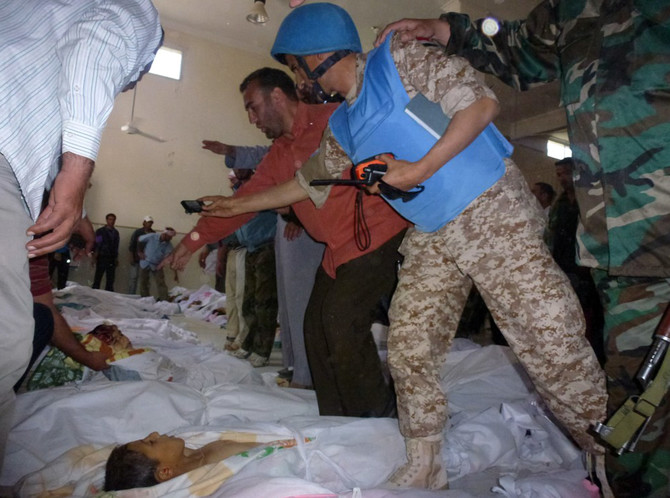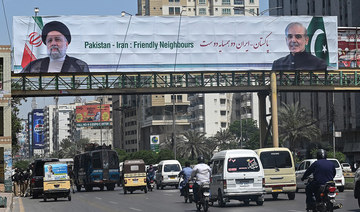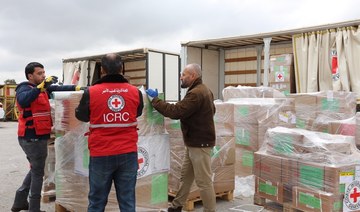AMMAN: President Bashar Assad faces renewed international pressure to end the bloodshed in Syria but, with peace envoy Kofi Annan visiting Damascus, his government blamed Islamist militants for a massacre in which UN observers had implicated his army.
Annan, on a mission from the United Nations and Arab League, is scheduled to meet Assad on Tuesday, when he can be expected to urge compliance with the tattered cease-fire deal which he brokered between government and rebels nearly seven weeks ago.
In Damascus on Monday, Annan called on the authorities to act to end the killing after what the special envoy called the “appalling crime” late last week at Houla, near Hama, in which at least 108 people, many of them children, were killed.
Russia and China, long defenders of Assad against Western lobbying for UN sanctions, backed a non-binding Security Council text on Sunday that criticized the use against the town of artillery and tanks - weaponry Syria’s rebels do not have.
But on a day when opposition activists said at least another 41 people had died in shelling of the city of Hama, Moscow and Beijing showed little sign of adopting the Arab and Western view that Assad should go. Both sides must come together to ensure a peaceful resolution, Russian and Chinese officials said.
Annan called on the Syrian government to “take bold steps to signal that it is serious in its intention to resolve this crisis peacefully” before adding: “This message of peace is not only for the government, but for everyone with a gun.”
In an open letter to the Security Council, Syria’s Foreign Ministry flatly denied any army role in the killings at Houla, an atrocity that shook world opinion out of growing indifference to a 14-month-old conflict that has killed over 10,000. Instead, the government blamed knife-wielding Islamist militants.
“Not a single tank entered the region and the Syrian army was in a state of self-defense,” it said in the letter published by state media. “Anything other than this is pure lies.
“The terrorist armed groups ... entered with the purpose of killing and the best proof of that is the killing by knives, which is the signature of terrorist groups who massacre according to the Islamist way.”
It said three Syrian soldiers were killed and 16 wounded.
SECTARIAN DIMENSION
UN Secretary-General Ban Ki-Moon had said UN observers who visited the site after the massacre “saw artillery and tank shells and as well as fresh tank tracks,” adding that many buildings were destroyed by heavy weapons. But UN monitors could not determine who had shot and stabbed many of the dead.
Witnesses and opposition activists said Assad’s forces, including “shabbiha” militiamen from his Alawite minority sect, carried out the massacre of the Sunni Muslim civilians in Houla.
The sectarian dimension to a conflict that began with mainly peaceful demonstrations among the Sunni majority has raised fear of a breakdown of society similar to that seen in Iraq - fear which has drawn many Syrians, including wealthier Sunnis, into defense of the four decade-rule of the Assad family.
However, in a sign of cracks in that solidarity, activists reported a widespread shuttering of shops and market stalls in the capital on Monday in what they described as a protest by the Sunni merchant class over the killings at Houla and elsewhere.
One activist, Amer Momen, said security police forced open dozens of shops. But he added: “The merchants are a crucial power center, ... the core of the silent majority. If they no longer remain silent, then the revolt has hit a milestone.”
INTERNATIONAL CALLS
China said it was “deeply shocked by the large number of civilian casualties in Houla, and condemns in the strongest terms the cruel killings of ordinary citizens, especially women and children.” Premier Wen Jiabao said support for the Annan truce, and a peaceful resolution, should be stepped up.
That deal calls for heavy weapons to be pulled out of towns and cities, followed by an end to fighting, and dialogue. But the attack on Hama was a reminder that the plan, policed by just 300 UN monitors, has done little to stem the violence.
“We are dealing with a situation in which both sides evidently had a hand in the deaths of innocent people,” Russian Foreign Minister Sergei Lavrov said.
French President Francois Hollande and British Prime Minister David Cameron discussed Syria by phone, condemning the “senseless murderous brutality of the Damascus regime.”
While both endorsed the Annan plan, they also called for an “orderly democratic transition” for Syria. Hollande said France would call a meeting in Paris of the Friends of Syria - Western and Arab countries that want Assad’s rule to end.
Russia has accused the United States and Europe of pursuing Libya-style regime change in Syria, and is wary of endorsing any measures that could become a prelude to armed intervention.
Media reports have suggested that Washington is trying to enlist Russia for a plan of the kind that brought about a handover from Yemen’s leader of three decades, Ali Abdullah Saleh, to an administration led by his own vice-president.
Washington has explicitly said Assad must step down, and General Martin Dempsey, chairman of the Joint Chiefs of Staff, told CNN: “Of course we always have to provide military options and they should be considered.”
But he stressed that economic and diplomatic measures should first be used to try to push Assad to “make the right decision.”
The opposition Syrian National Council made its strongest call yet for military aid. “The council appeals to all friends and brothers of the Syrian people to supply it immediately with effective means of self-defense before it is too late,” it said.
But President Barack Obama, on a day when Americans honored their war dead, spoke of “the light of a new day” with the withdrawal of US forces from Iraq and Afghanistan. He promised a nation, which he hopes will re-elect him in November, that he would not send troops abroad unless “absolutely necessary.”
























